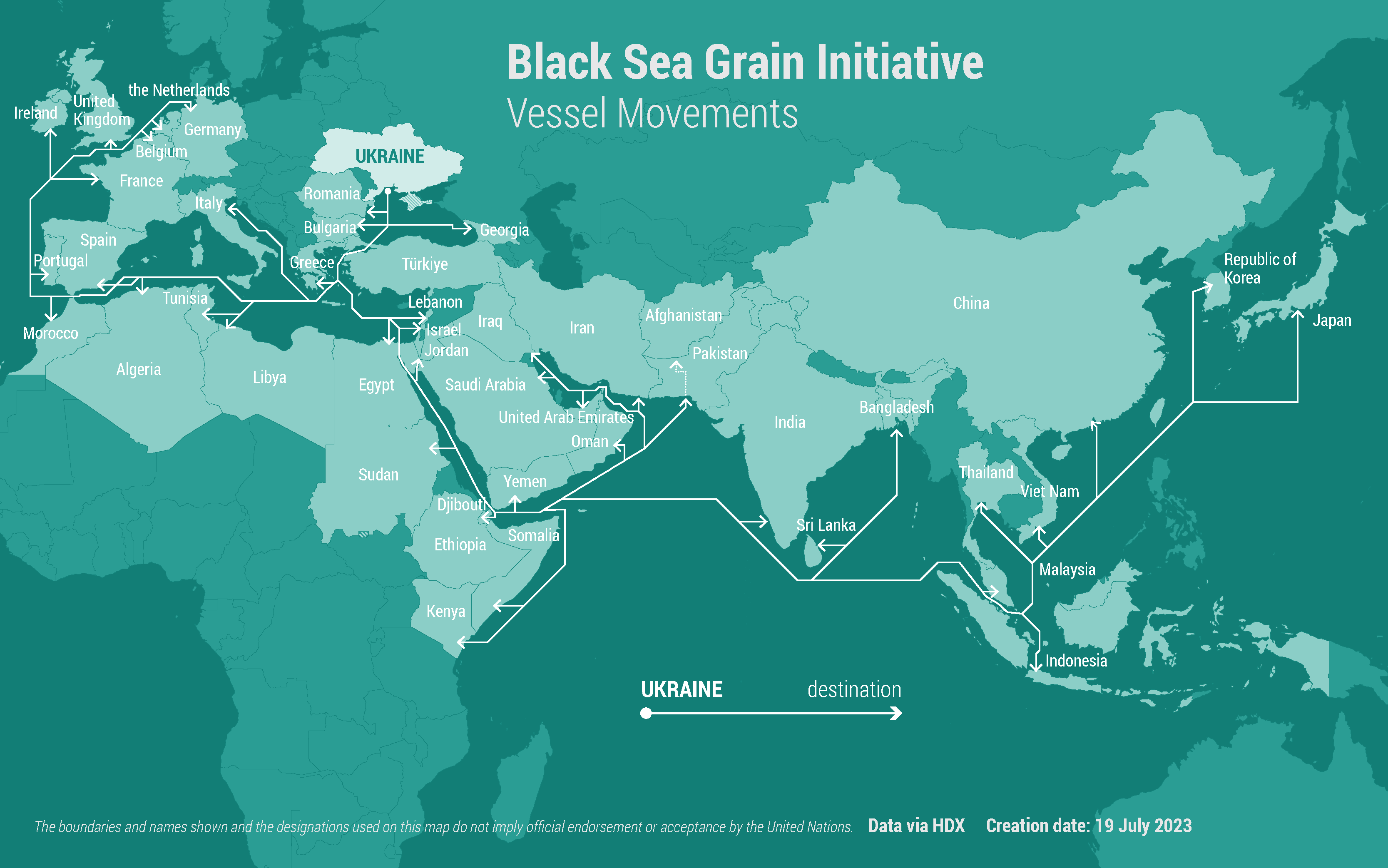The Russia-Ukraine war has unleashed profound chaos, earning its reputation as a modern-day David vs. Goliath narrative. This conflict has inflicted extensive harm on the lives and livelihoods of both nations’ citizens. Moreover, the war has further resulted in exponential economic challenges as the trade routes that navigate through these war-hit countries also faced massive roadblocks. Hence, the repercussions of war have transcended national boundaries. A prominent example of this is the dramatic surge in wheat prices to crisis levels in Pakistan. This occurred when Russia invaded Ukraine, one of the world’s major foodgrain exporters, in early 2022. The restrictions and blockades imposed by Russia at Ukraine’s ports and docks heightened concerns about food security in poor neighboring countries resulting in causalities as that of Pakistan.
It was only to tackle this situation that, the UN and Turkey, engineered the Black Sea Grain Initiative in the interim and took Russia to agree for the same. The initiative entailed that cargo ships would observe travel and movement from three Ukrainian ports of Odesa, Chornomorsk and Pivdennyi (Yuzhny) and also facilitated exports of Russian food and fertilizers through the international waters of the Blacked Sea. The Black Sea Grain Initiative chalked a passage in the Black Sea that was 310 nautical miles and three nautical miles wide. The initiative has resulted in nearly 32 million tonnes of food grains exported from Ukraine.
Why has the Black Sea Grain Initiative NOT Been Renewed Again?
The initiative on paper seemed sound and hence explains as to why the deal had been extended twice. However, Russia recently withdrew from renewing the Black Sea Grain deal claiming that the commitments and promises under the deal that favors Russia, have not been met and therefore, the country is facing hardships in exporting its agriculture products and fertilizers. Russia claimed that this is because of innumerable sanctions that the West had placed in the advent of the invasion of Kyiv. While there is no explicit evidence of restrictions from the West that cause an impediment in facilitating this deal, Russia contests that sanctions on payment platforms, Insurance, shipping, and other logistics have vicariously affected the smooth functioning of this deal and therefore have hampered the export business.
In addition, Russia also emphasized that its commitment to the agreement was rooted in the goal of preserving global food security. They argued that Ukraine has since made foodgrain exports to high- and middle-income nations only which has led to negligence of food security objectives for poorer countries. In support of Russia’s stance, the United Nations, the broker of the deal, acknowledged that while Ukraine primarily served larger economies, the establishment of these export channels had a positive ripple effect. It resulted in a comprehensive reduction in food prices, aligning with the primary aim of enhancing global food security. This nuanced perspective underscores the multifaceted impact of international food trade, where even exports to affluent nations can indirectly benefit the broader global community by stabilizing prices and contributing to food security goals.
G20 and Black Sea Grain Deal
The globe waited with bated breath for the G20 Summit 2023 as it was the first prominent global summit that was happening since Russia invaded Ukraine in 2022. There were huge anticipations and forethought as to what discussions would take place and whether the Russia-Ukraine war would finally have some amicable resolutions. While there may not have been any explicit directions or plan of action hinting towards reaching a consensus between the two nations at loggerheads, there was a direct expression of world leaders calling on Russia to rejoin the Black Sea Grain Deal. Following the consensus on the New Delhi Leaders’ Summit Declaration, the leaders recommended reviving the Black Sea Grain Initiative to help the movement of grains, food, and fertilizers from Russia and Ukraine to the rest of the world. The leaders opined that a smooth discharge of both the country’s obligations pertaining to the instruments of the initiative, shall ease inflation in several countries and ensure food security as well.
The External Affairs Minister S. Jai Shankar while addressing the press also recognized the adverse implications that the ongoing war in Ukraine is inflicting on the global economy. He stressed the fact that there are nations that are still recovering from the pandemic and economic disruption and further stressed that defying them food grains is detrimental to global peace and economy. Furthermore, he also emphasized the three F’s i.e., food, fuel and fertilizers were the issues of special concern in this summit and hence the reinstatement and restitution of the Black Sea Grain deal invites grave seriousness.
Why is the Black Sea Grain Initiative crucial for the World?
While the spotlight remains centered on the two nations i.e., Russia and Ukraine, the initiative has had a reverberation effect across the world. Ever since, 1st August 2022, multiple ships have ferried tons of foodgrains from Ukraine to several parts of the world, out of which one-third of shipments have been exported to lower-income countries like Egypt, Iran, Bangladesh, Kenya, Somalia, Sudan, etc. This has resulted in a cooling down of food prices that has inherently been the key aim of the instant initiative. In addition, the initiative also stimulates collaborative efforts of two countries that are at major loggerheads, to jointly work together which might lead to an amicable solution to the war that otherwise seems uncertain. Hence it becomes extremely vital for Russia to work in furtherance of reconstituting the initiative and make a huge difference in the global cost of living crisis.

